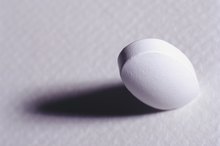What does fact checked mean?
At Healthfully, we strive to deliver objective content that is accurate and up-to-date. Our team periodically reviews articles in order to ensure content quality. The sources cited below consist of evidence from peer-reviewed journals, prominent medical organizations, academic associations, and government data.
- Office of Dietary Supplements: Dietary Supplement Fact Sheet: Selenium
- Linus Pauling Institute: Selenium; Jane Higdon, Ph.D.; November 2007
The information contained on this site is for informational purposes only, and should not be used as a substitute for the advice of a professional health care provider. Please check with the appropriate physician regarding health questions and concerns. Although we strive to deliver accurate and up-to-date information, no guarantee to that effect is made.
Almonds and Selenium
Almonds are packed with various vitamins, minerals and other vital nutrients. While not a significant source, almonds provide small amounts of selenium, an essential mineral. You can obtain adequate amounts of selenium daily by consuming almonds and other foods that provide selenium, such as seafood, meats, certain grains and other nuts. Consult a registered dietitian for a detailed list of selenium-rich foods.
Almond Nutrition
One-half cup of whole almonds provides 1.8 mcg of selenium and less than 5 percent of your recommended daily value, or DV. A food source that provides less than 5 percent of the recommended DV is considered a low source for that specific nutrient. In addition to selenium, almonds are sources of protein, fiber and essential fatty acids. Almonds are also natural sources of other minerals, such as:
- calcium
- iron
- magnesium
- phosphorus
- potassium
- manganese
- zinc
- One-half cup of whole almonds provides 1.8 mcg of selenium and less than 5 percent of your recommended daily value, or DV.
- A food source that provides less than 5 percent of the recommended DV is considered a low source for that specific nutrient.
Selenium Function
Do Nuts Have Folic Acid?
Learn More
Selenium is an essential mineral that the body cannot produce and it must be obtained through the diet. Selenium is an antioxidant that plays vital roles in normal thyroid function and immunity. As an antioxidant, selenium helps protect cells from damage caused by free radicals. Free radicals are harmful byproducts that may contribute to the development of various diseases.
- Selenium is an essential mineral that the body cannot produce and it must be obtained through the diet.
- Selenium is an antioxidant that plays vital roles in normal thyroid function and immunity.
Daily Recommendations
The recommended dietary allowance, or RDA, for selenium for adults is 55 mcg daily 1. Pregnant and lactating women require greater amounts of selenium daily, approximately 60 to 70 mcg. Growing children require less, 30 to 40 mcg of selenium per day. Individual nutrient requirements vary based on many different factors. Consult a registered dietitian for your specific nutrient requirements, calorie needs and other specialized nutritional guidelines.
- The recommended dietary allowance, or RDA, for selenium for adults is 55 mcg daily 1.
- Pregnant and lactating women require greater amounts of selenium daily, approximately 60 to 70 mcg.
Diet Considerations
How Much Magnesium Per Day?
Learn More
Almonds make a healthy snack throughout the day and can also be added to your morning cereal, lunch salad or dinner dish. Almonds also can be added to your favorite baked goods recipe. Since almonds have a high fat and calorie content, moderate consumption is recommended. However, you should not obtain selenium from only almonds. Other nuts that contain selenium include cashews and Brazil nuts.
- Almonds make a healthy snack throughout the day and can also be added to your morning cereal, lunch salad or dinner dish.
Related Articles
References
- Office of Dietary Supplements: Dietary Supplement Fact Sheet: Selenium
- Linus Pauling Institute: Selenium; Jane Higdon, Ph.D.; November 2007
- Ventura M, Melo M, Carrilho F. Selenium and thyroid disease: From pathophysiology to treatment. International Journal of Endocrinology. 2017;2017:1297658. doi:10.1155/2017/1297658.
- Santos LR, Neves C, Melo M, Soares P. Selenium and selenoproteins in immune mediated thyroid disorders. Diagnostics. 2018 Oct 4;8(4):70. doi:10.3390/diagnostics8040070.
- Wichman J, Winther KH, Bonnema SJ, Hegedus L. Selenium supplementation significantly reduces thyroid autoantibody levels in patients with chronic autoimmune thyroiditis: A systematic review and meta-analysis. Thyroid. 2016 Dec;26(12):1681–1692. doi:10.1089/thy.2016.0256
- Office of Dietary Supplements. Selenium: Fact Sheet for Professionals. National Institutes of Health. U.S. Department of Health and Human Services. Updated September 26, 2018. https://ods.od.nih.gov/factsheets/Selenium-HealthProfessional/#h7
- Hu S, Rayman MP. Multiple nutritional factors and the risk of Hashimoto's Thyroiditis. Thyroid. 2017 May;27(5):597–610. doi:10.1089/thy.2016.0635.
Writer Bio
Anthony Isaac Palacios has been a professional writer for more than five years for various media including magazine, newspaper and the Internet. He has a Master of Science in dietetics and nutrition and specializes in health and nutrition articles for the general public. Palacios enjoys cooking with wine, and sometimes even adding it to the food.









